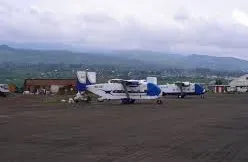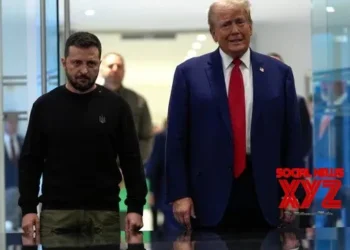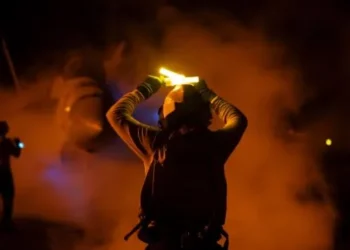Islamism is a first-order threat to the security of open, modern, culturally tolerant societies. Its defeat, like that of revolutionary communism, ultimately will come through confronting its violence and ideology with a combination of hard and soft power
THE Taliban are part of the global movement of radical Islam. The movement contains many different groups, but they share the same basic ideology. In simple terms, this holds that there is only one true faith and only one true view of that faith, and that society, politics, and culture should be governed only by that view. Radical Islam believes not only in Islamism – the turning of the religion of Islam into a political doctrine – but in the justification of struggle, by armed means if necessary, to achieve it. Other Islamists agree with the ends but eschew violence. This ideology inevitably conflicts with open, modern, culturally tolerant societies. Nearly everything about the September 11, 2001, terror attacks and their aftermath, particularly now, is mired in controversy. But what cannot be seriously disputed is that since 9/11, though thankfully there has been no further terrorist attack on that scale, radical Islam has not declined in force. What is disputed is why.
Is radical Islam a coherent ideology that represents a first-order threat to our security? Or are we facing, despite some common themes, a series of disconnected security challenges, each of which requires handling on its own terms, based on local circumstances? Is Islamism itself a problem, or only its manifestation in violent extremism? Is it akin to revolutionary communism and thus to be countered by a combination of security and ideological measures over the long term? Or is that to overstate and overestimate Islamism and thus perversely, as some argue about the Western interventions in Afghanistan and Iraq, to elevate its appeal rather than diminish it?
This is a fundamental strategic question. And it needs a clear answer. In my view, Islamism, both the ideology and the violence, is a first-order security threat. If left unchecked, it will come to us, even if centered far away from us, as 9/11 demonstrated. The recent analysis by Emman El-Badawy of my institute shows how Islamism’s roots stretch back over many decades and grew in strength long before 9/11, and examines the links between the ideology and the violence. This is supplemented by Ahmet Kuru’s excellent analysis of the Ulema-State concept and by our annual report on jihadist groups, which shows that this is a global challenge that is getting worse.
This ideology – whether Shia, promulgated by the Islamic Republic of Iran, or Sunni, promoted by groups on a spectrum from the Muslim Brotherhood through to al-Qaeda, the Islamic State (ISIS), Boko Haram, and many others – has been the principal cause of destabilisation across the Middle East and beyond. Today, it is a principal focus of instability in Africa.
Like revolutionary communism, Islamism operates in many different arenas and dimensions. Its defeat also ultimately will come through confronting both the violence and the ideology with a combination of hard and soft power. But if this analysis is correct, then especially after the fall of Afghanistan, the leading powers must unite to develop an agreed strategy.
Even if initial discussions on forging one center around Western countries, China and Russia also have profound security interests in countering this ideology. And the West’s best allies in formulating a successful strategy are to be found among the world’s many Muslim-majority countries, including those in the Middle East, which are desperate to retake their religion from extremism. We also need to assess our vulnerability accurately. COVID-19 has taught all of us about deadly pathogens. Bio-terror possibilities may seem like the stuff of science fiction, but we would be wise now to prepare for their potential use by non-state actors.
If we reject this analysis, the alternative is, in effect, to say that Islamism is a second-order problem. Where we are directly threatened, we retaliate through counter-terrorism measures, involving drone strikes, surveillance, and special forces. Otherwise, we leave matters alone. But if this is where policy is heading, it is far too limited in its understanding of the problem.
We need to work out what we mean by not “remaking” countries from which terrorist threats can arise. I understand it means that we do not attempt what we tried in Afghanistan. But one thing should be understood: our “remaking” of Afghanistan did not fail because the Afghan people didn’t want their country “remade.” For sure, we could have “remade” better, but Afghans did not choose the Taliban takeover. The Taliban have reconquered the country by violence, not persuasion.
The main barrier to “nation-building” is usually not a country’s people, but rather poor institutional capacity and governance, including corruption, over many years. Above all, there is the challenge of trying to build while internal elements with external support are trying to destroy.
But counter-terrorism measures alone won’t remove an entrenched threat. Instead, we could seek a middle course. For example, in the Sahel, we could adopt a strategy of assisting countries with security but also supporting governments’ own development efforts, because poverty and underdevelopment undoubtedly facilitate the extremists. In a way, this is what we did in Afghanistan after 2014 when NATO’s mission became one of “train, advise, and assist.”
Even this will encompass more than conventional counter-terrorism. We will need some “boots on the ground.” Naturally, our preference is for the boots to be local. But that will not always be possible. Yet, Western societies have understandably become deeply averse to casualties amongst their armed forces.
This is not a problem of the West’s armed forces themselves, which comprise brave, extraordinary people. But it is now an overwhelming political constraint to any commitment to Western boots on the ground, except for special forces. The problem this gives rise to is obvious: if the enemy we are fighting knows that the more casualties they inflict, the more our political will to fight erodes, then the incentive structure is plain.
One of the most depressing things I have heard regularly articulated in recent weeks is the idea that we are foolish to believe that Western notions of liberal democracy and freedom are exportable, or will ever take root except in the decadent terrain of Western society. Perhaps my generation of leaders was naive in thinking countries could be “remade.” Or maybe the “remaking” needed to last longer. But as we see many Afghan women fleeing in fear of their lives, we should never forget that our values are those that free people choose. Recovering confidence in these, and in their universal application, is a necessary part of ensuring we stand up for them and are prepared to defend them.






















